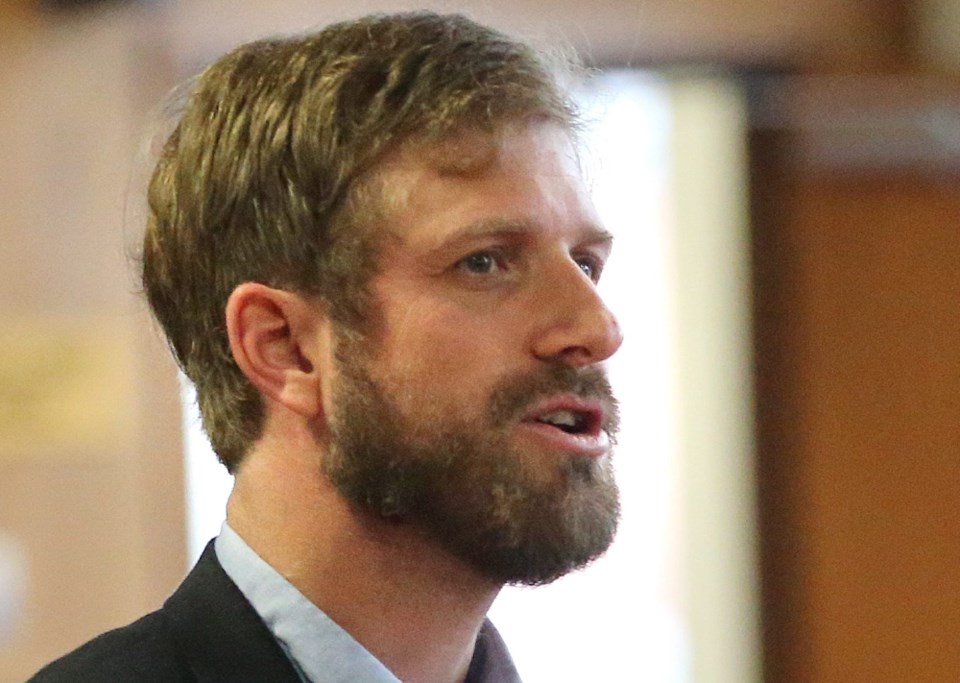If Victoria voters truly dislike the idea of paying city councillors for full-time work, it might be time for a conversation with residents about what they expect from their elected officials and what services they’d be prepared to do without, Coun. Ben Isitt said Tuesday.
“There’s a body of opinion that seems to say that being a council member isn’t a job, it’s something else,” he said. “And the fact is, it is a job. For most people around that table, it’s their sole source of income.”
Isitt was responding to the results of a budget survey that soundly rejected the idea of raising councillors’ pay more than 50 per cent.
Of the more than 5,000 people who participated in the online survey, 86 per cent said they “strongly disagreed” with increasing councillors’ remuneration to $70,100 a year — the same as the median income of a city employee, excluding police officers and firefighters.
Councillors are currently paid $45,384, with an annual increase tied to inflation, according to figures provided by the city.
Isitt had suggested tying councillors’ salaries to that of a full-time city employee, arguing that councillors are spending up to 60 hours a week on city business.
The Greater Victoria Chamber of Commerce and others countered that councillors greatly expanded their responsibilities and have turned what should be a part-time job into full-time work.
A staff report going to committee of the whole Thursday noted that the budget survey was not a random representative sample of Victoria residents, and instead reflected the views of those “who became aware of the survey and decided to complete it.”
Isitt said in an interview that he had concerns about the methodology of the survey and the fact that people from other communities could take part, simply by claiming to live in a Victoria neighbourhood. “But that said, there is a clear message that a substantial segment of the public does not support an increase in remuneration at this time,” he said. “So I think council has to consider that perspective.”
Isitt said he doesn’t agree with reining in councillors’ duties as the chamber of commerce has suggested, but he acknowledged that it might be time to have that discussion with residents.
“It’s not practical to have an ordinary job and serve on council with the current schedule of meetings and the current reading load,” he said. “If the chamber of commerce thinks it would be fine for council members to skim the agenda packages or ignore them entirely, I’m not sure that’s good governance.
“I personally don’t think that would be good for the community and I don’t think it would provide good governance, but I think it’s a conversation we have to have if that’s the direction the public wants us to go.”
Isitt said one solution might be for council to hold all its meetings in the evenings so councillors can get regular day jobs. Another option would be for councillors to stop responding to every email, telephone call, meeting request and media inquiry, so they have more time to focus on supervising municipal operations, he said.
“If we truly were to scale this back to essentially a part-time job in the evenings, with council members having regular employment ,like they do in Saanich and everywhere else, there simply wouldn’t be the bandwidth to be responsive in that way,” he said.
“Some emails you’d simply have to hit delete. I always reply to every message I receive from a city of Victoria resident.”
Isitt, who received more votes than any other Victoria candidate in the last municipal election, said another casualty would be the kind of innovative policy-making that advances housing rights, fights climate change or moves toward a sustainable transportation system.
“Innovation in policy-making would not be taking place, and there are conservative elements in our community that want to see that,” he said. “But you look at the election results, year after year, [and] there seems to be very strong public support for having the City of Victoria being a leader in driving innovation and evolving what local government does and what it means to citizens.
“Those types of initiatives and actions would completely fall off the table if council members were essentially having to be council members off the side of their desk.”



